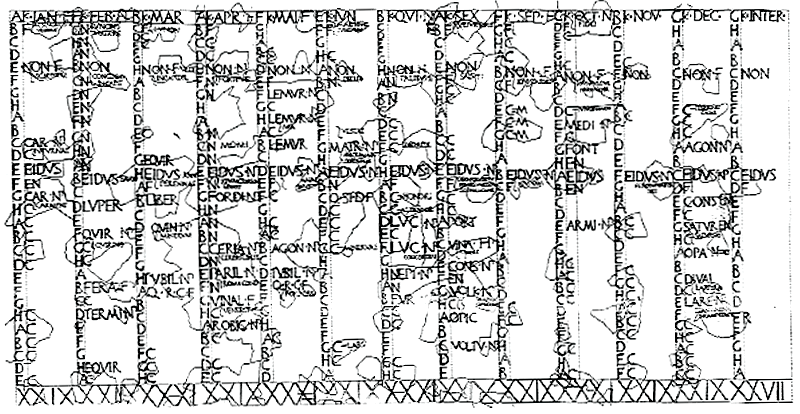|
Sextilis
Sextilis () or ''mensis Sextilis'' was the Latin name for what was originally the sixth month in the Roman calendar The Roman calendar was the calendar used by the Roman Kingdom and Roman Republic. Although the term is primarily used for Rome's pre-Julian calendars, it is often used inclusively of the Julian calendar established by Julius Caesar in 46&nbs ..., when March ('' Martius'', " Mars' month") was the first of ten months in the year. After the calendar reform that produced a twelve-month year, Sextilis became the eighth month, but retained its name. It was renamed ''Augustus'' ( August) in 8 BC in honor of the first Roman emperor, Augustus. Sextilis followed Quinctilis, which was renamed ''Julius'' (July) after Julius Caesar, and preceded September (Roman month), September (from ''septem'', "seven"), which was originally the seventh month. The month ''Augustus'' ''Quintilis, Julius'' (July) was renamed from ''Quintilis'' ("fifth" month) in honor of Julius Ca ... [...More Info...] [...Related Items...] OR: [Wikipedia] [Google] [Baidu] |
Roman Calendar
The Roman calendar was the calendar used by the Roman Kingdom and Roman Republic. Although the term is primarily used for Rome's pre-Julian calendars, it is often used inclusively of the Julian calendar established by Julius Caesar in 46 BC. According to most Roman accounts, #Romulus, their original calendar was established by their Roman legend, legendary list of kings of Rome, first king Romulus. It consisted of ten months, beginning in spring with March and leaving winter as an unassigned span of days before the next year. These months each had 30 or 31 days and ran for 38 nundinal cycles, each forming a kind of eight-day weeknine days inclusive counting, counted inclusively in the Roman mannerand ending with religious rituals and a Roman commerce, public market. This fixed calendar bore traces of its origin as an observational calendar, observational lunar calendar, lunar one. In particular, the most important days of each monthits kalends, nones (calendar), nones, a ... [...More Info...] [...Related Items...] OR: [Wikipedia] [Google] [Baidu] |
Quinctilis
In the ancient Roman calendar, Quintilis or Quinctilis was the month following Junius (month), Junius (June) and preceding Sextilis (August). ''Quintilis'' is Latin for "fifth": it was the fifth month (''quintilis mensis'') in the earliest calendar attributed to Romulus, which began with Martius (month), Martius ("Mars (god), Mars' month," March) and had 10 months. After the calendar reform that produced a 12-month year, Quintilis became the seventh month, but retained its name. In 45 BC, Julius Caesar instituted a new calendar (the Julian calendar) that corrected astronomical discrepancies in the old. After his death in 44 BC, the month of Quintilis, his birth month, was renamed ''Julius'' in his honor, hence July."Los Cielos de Agosto" (Spanish: "The Skies of August"), Jorge R. Ianiszewski, ''Circulo Astronomico'', 2006, webpageCirA-Agosto Quintilis was under the guardianship ''(tutelary deity, tutela)'' of the Romans' supreme deity Jupiter (mythology), Jupiter, with sacrifices ... [...More Info...] [...Related Items...] OR: [Wikipedia] [Google] [Baidu] |
Quintilis
In the ancient Roman calendar, Quintilis or Quinctilis was the month following Junius (June) and preceding Sextilis (August). ''Quintilis'' is Latin for "fifth": it was the fifth month (''quintilis mensis'') in the earliest calendar attributed to Romulus, which began with Martius (" Mars' month," March) and had 10 months. After the calendar reform that produced a 12-month year, Quintilis became the seventh month, but retained its name. In 45 BC, Julius Caesar instituted a new calendar (the Julian calendar) that corrected astronomical discrepancies in the old. After his death in 44 BC, the month of Quintilis, his birth month, was renamed ''Julius'' in his honor, hence July."Los Cielos de Agosto" (Spanish: "The Skies of August"), Jorge R. Ianiszewski, ''Circulo Astronomico'', 2006, webpageCirA-Agosto Quintilis was under the guardianship ''( tutela)'' of the Romans' supreme deity Jupiter, with sacrifices made particularly to Neptune and Apollo. Agricultural festivals directed at t ... [...More Info...] [...Related Items...] OR: [Wikipedia] [Google] [Baidu] |
Julian Calendar
The Julian calendar is a solar calendar of 365 days in every year with an additional leap day every fourth year (without exception). The Julian calendar is still used as a religious calendar in parts of the Eastern Orthodox Church and in parts of Oriental Orthodox Churches, Oriental Orthodoxy as well as by the Amazigh, Amazigh people (also known as the Berbers). The Julian calendar was proposed in 46 BC by (and takes its name from) Julius Caesar, as a reform of the earlier Roman calendar, which was largely a lunisolar calendar, lunisolar one. It took effect on , by his edict. Caesar's calendar became the predominant calendar in the Roman Empire and subsequently most of the Western world for more than 1,600 years, until 1582 when Pope Gregory XIII promulgated a revised calendar. Ancient Romans typically designated years by the names of ruling consuls; the ''Anno Domini'' system of numbering years was not devised until 525, and became widespread in Europe in the eighth cent ... [...More Info...] [...Related Items...] OR: [Wikipedia] [Google] [Baidu] |
Augustus
Gaius Julius Caesar Augustus (born Gaius Octavius; 23 September 63 BC – 19 August AD 14), also known as Octavian (), was the founder of the Roman Empire, who reigned as the first Roman emperor from 27 BC until his death in AD 14. The reign of Augustus initiated an Roman imperial cult, imperial cult and an era of regional hegemony, imperial peace (the or ) in which the Roman world was largely free of armed conflict. The Principate system of government was established during his reign and lasted until the Crisis of the Third Century. Octavian was born into an equites, equestrian branch of the plebeian Octavia gens, Octavia. Following his maternal great-uncle Julius Caesar's assassination of Julius Caesar, assassination in 44 BC, Octavian was named in Caesar's will as his Adoption in ancient Rome, adopted son and heir, and inherited Caesar's name, estate, and the loyalty of his legions. He, Mark Antony, and Marcus Lepidus formed the Second Triumvirat ... [...More Info...] [...Related Items...] OR: [Wikipedia] [Google] [Baidu] |
August
August is the eighth month of the year in the Julian and Gregorian calendars. Its length is 31 days. In the Southern Hemisphere, August is the seasonal equivalent of February in the Northern Hemisphere. In the Northern Hemisphere, August falls in summer. In the Southern Hemisphere, the month falls during winter. In many European countries, August is the holiday month for most workers. Numerous religious holidays occurred during August in ancient Rome. Certain meteor showers take place in August. The Kappa Cygnids occur in August, with yearly dates varying. The Alpha Capricornids meteor shower occurs as early as July 10 and ends around August 10. The Southern Delta Aquariids occur from mid-July to mid-August, with the peak usually around July 28–29. The Perseids, a major meteor shower, typically takes place between July 17 and August 24, with the peak days varying yearly. The star cluster of Messier 30 is best observed around August. Among the aborigines of the Canary ... [...More Info...] [...Related Items...] OR: [Wikipedia] [Google] [Baidu] |
September (Roman Month)
September (from Latin ''septem'', "seven") or ''mensis September'' was originally the seventh of ten months on the ancient Roman calendar that began with March (''Martius (month), mensis Martius'', "Mars (mythology), Mars' month"). It had 29 days. After the reforms that resulted in a 12-month year, September became the ninth month, but retained its name. September followed what was originally Sextilis, the "sixth" month, renamed ''Augustus'' in honor of the first Roman emperor, and preceded October (Roman month), October, the "eighth" month that like September retained its numerical name contrary to its position on the calendar. A day was added to September in the mid-40s BC as part of the Julian calendar, Julian calendar reform. September has none of the archaic Roman festivals, festivals that are marked in large letters for other months on List of ancient Roman fasti, extant Roman ''fasti''. Instead, about half the month is devoted to the ''Ludi Romani'', "Roman Games", which dev ... [...More Info...] [...Related Items...] OR: [Wikipedia] [Google] [Baidu] |
Sousse Mosaic Calendar August
Sousse, Sūsah , or Soussa (, ), is a city in Tunisia, capital of the Sousse Governorate. Located south of the capital Tunis, the city has 271,428 inhabitants (2014). Sousse is in the central-east of the country, on the Gulf of Hammamet, which is a part of the Mediterranean Sea. Its economy is based on transport equipment, processed food, olive oil, textiles, and tourism. It is home to the Université de Sousse. Toponymy ''Sousse'' and ''Soussa'' are both French spellings of the Arabic name ''Sūsa''. The present city has also grown to include the ruins of Hadrumetum, which had many names in several languages during antiquity.Barrington Atlas of the Greek and Roman World, Gazeteer, page 511, Map 33 Theveste-Hadrumetum, Compiled by R.B. Hitchner, 1997, in file BATL033_.PDF iB_ATLAS.ZIP froPrinceton University Press , Subjects, Barrington Atlas of the Greek and Roman World. R.J.A. Talbert, ed. Barrington Atlas of the Greek and Roman World, Edited by Richard J. A. Talber ... [...More Info...] [...Related Items...] OR: [Wikipedia] [Google] [Baidu] |
Auspices
Augury was a Greco- Roman religious practice of observing the behavior of birds, to receive omens. When the individual, known as the augur, read these signs, it was referred to as "taking the auspices". "Auspices" () means "looking at birds". ''Auspex'', another word for augur, can be translated to "one who looks at birds". Depending upon the birds, the auspices from the gods could be favorable or unfavorable (''auspicious'' or ''inauspicious''). Sometimes politically motivated augurs would fabricate unfavorable auspices in order to delay certain state functions, such as elections. Pliny the Elder attributes the invention of auspicy to Tiresias the seer of Thebes. Over the development of the Roman empire, the definition of augury broadened to include other forms of divination. Haruspicy —the examination of animal entrails—was learned from the Etruscans. The Etruscan practice of observing thunder and lightning was also adapted. In Cicero’s time, the augurs had mostly swit ... [...More Info...] [...Related Items...] OR: [Wikipedia] [Google] [Baidu] |
Roman Egypt
Roman Egypt was an imperial province of the Roman Empire from 30 BC to AD 642. The province encompassed most of modern-day Egypt except for the Sinai. It was bordered by the provinces of Crete and Cyrenaica to the west and Judaea, later Arabia Petraea, to the East. Egypt was conquered by Roman forces in 30 BC and became a province of the new Roman Empire upon its formation in 27 BC. Egypt came to serve as a major producer of grain for the empire and had a highly developed urban economy. It was by far the wealthiest Roman province outside of Italy. The population of Roman Egypt is unknown, although estimates vary from . Alexandria, its capital, was the largest port and second largest city of the Roman Empire. Three Roman legions garrisoned Egypt in the early Roman imperial period, with the garrison later reduced to two, alongside formations of the Roman army. The major town of each '' nome'' (administrative region) was known as a metropolis and gr ... [...More Info...] [...Related Items...] OR: [Wikipedia] [Google] [Baidu] |







